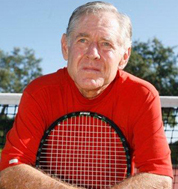 |
Tennis Star Cliff Richey on Acing Depression
Powerful Patient, 2010 Week 16
Host: Joyce Graff, http://powerfulpatient.org, editor@vhl.org 800-767-4845

Cliff Richey |
In 1970 Cliff Richey was at the top of his tennis game. And then he met his toughest match: depression. Cliff talks with Joyce about his new book, and about how he has learned to live with depression.
About our Guest:
Cliff Richey, who 40 years ago was the No. 1-ranked American tennis player and the hero of the 1970 championship-winning U.S. Davis Cup team, was the winner of the first-ever professional Grand Prix points title. In his book, Acing Depression, he discusses the most difficult opponent of his life, depression. Richey calls depression among adult males as “the silent tragedy in our culture today” and details his life-long battle with the disease that afflicts approximately 121 million people around the world. Co-written with his oldest daughter Hilaire Richey Kallendorf - [Buy the book from Amazon.com - Acing Depression: A Tennis Champion's Toughest Match .] .]
About Acing Depression:
As tennis star Jimmy Connors writes in the Foreword to Acing Depression, “What made Cliff Richey what he was on the tennis court has certainly carried over into this book. His story has taken a subject, depression—which has affected him personally—and put it out there for everyone to see. Depression has been a subject that no one really talks about. Few people even admit to having such a condition. But Cliff is not afraid to be bold and reveal what he has gone through and what it takes to get a handle on this disease…Just as Cliff played tennis, he is studying how depression works; what its weaknesses are; and what strategies you can use against it. His hope is that people who read his story can learn—learn about the disease and learn that people who suffer can have a better quality of life. Things can get better. There is hope.”
Getting help for depression:
Everyone has down times. The problem deepens when we are “stuck” in the down place. If you feel you are depressed and are ready to seek help, the first place to start is with your primary care physician. Don’t let them “blow you off,” and don’t let them simply hand you a prescription. Neither of those is the right solution. What you want is:
-
A thorough physical check-up to make sure there are no underlying physical causes for these feelings. Imbalance of thyroid or adrenal function, or things like a brain tumor, may also cause depression. Check first to see if there is a physical issue that needs to be remedied.
-
A careful review of the medications and all supplements you are taking, to see if there are drugs that are interacting badly, or if depression is listed as a possible side effect of one or more of the drugs you are taking.
-
A careful review of what you are really eating – not just what you think you should eat, but what you are really putting into your mouth. Keep a food diary for a week, and review it with your doctor or a nutritionist to make sure you are getting the vitamins you need, and that you are not eating too much of the kinds of foods that cause downward mood swings.
-
A serious self-assessment of your consumption of tobacco, alcohol, marijuana, and any other “recreational” drugs you may be using. While these can make you feel better for a short time, they will generally make depression worse.
-
An examination of the stresses in your life, and ways to manage them. It can be helpful to talk with a counselor to do this, to give you more prespective on your issues.
Cliff used an analogy to a tennis pro working to improve his game. Even the finest athletes use “coaches” to help them observe, analyze, and improve the fine points of their game. Similarly, it helps to have another person looking with you at the issues you are facing, to help you observe, analyze, and improve them.
There is a time and a place for anti-depressant drugs, but it is best not to leap to them too soon. There may be other explanations, or other less radical treatments that can help. Studies show that drugs are not significantly more helpful for mild or moderate depression than diet, exercise, meditation, and stress management. If you and your physician have done these careful analyses and believe that a drug will help, a drug should be introduced and evaluated carefully to determine that the drug is helping, that the dosage is correct, and that the side effects are being appropriately managed.
See also our interview with Dr. Kathi Kemper, Mental Health, Naturally
Buy the book from Amazon.com
Cliff Richey, Acing Depression: A Tennis Champion's Toughest Match
|
